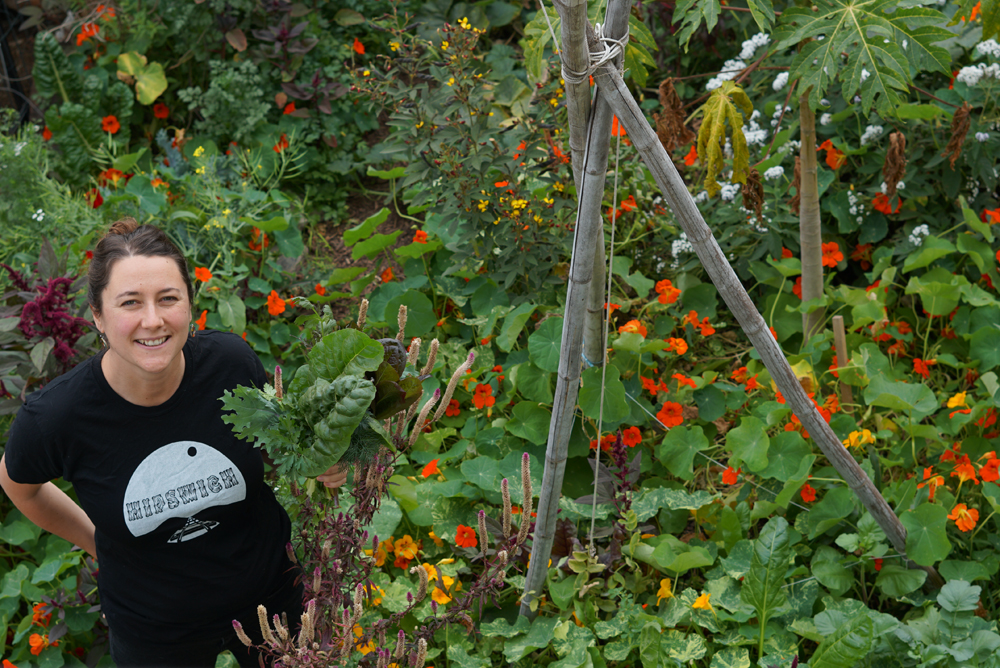Think you need a big block to grow your own food or start composting? Think again.
Over the past five years, Ipswich resident Jen Mouritz has transformed her small front yard into a thriving home-grown produce fair and now she’s encouraging others to give it a go.
Ms Mouritz said there are some major benefits to gardening on a small block.
“Having a smaller space means that everything is close by such as access to the water tank and garden tools,” she said.
“We can easily head down the stairs to pick fresh herbs, greens and veggies to use in the kitchen.
“It is amazing how much you can grow in a small space.
“It is also really easy to have multiple compost bins in amongst the vegetable gardens so that you don’t have to trek too far and when one fills up you have others you can use.
“Having everything in the front garden means it is really quick and easy to transport compost straight onto the garden beds.”
Check out the latest edition of Sustainability in the Suburbs for more tips from Ms Mouritz on gardening and composting on a small block.
It comes after residents told Ipswich City Council that they wanted to grow their own food as a way of being more sustainable at home, but they thought having a small block was stopping them from doing so.
The cost also discouraged them, but Ms Mouritz said it doesn’t need to be expensive.
“You can collect quite a lot of organic matter to begin your garden beds for little or no cost, for example, cardboard, shredded paper, lawn clippings, raked leaves, animal manure (cow or horse is good) and kitchen scraps that can be turned into compost,” she said.
“If you can use these in a layered ‘no-dig’ style garden bed, you will find it starts to improve the soil very quickly.”
Ms Mouritz’s biggest tip for new gardeners? Start small.
“I mapped out a few beds, and over time they have grown and I have now expanded the garden to nearly fill the whole front yard,” she said.
“There are some really fool-proof plants to start with and for me they are – rainbow chard or silverbeet, marigolds, cherry tomatoes, herbs, lettuce, beans and Asian greens.”
And if you’re really serious about growing your own veggies, Ms Mouritz suggests getting a water tank.
“By collecting rainwater, you can save money on your water bill – especially in summer,” she said.
Ms Mouritz is also a big fan of composting.
“Compost is just so good for the soil. It acts as a mulch and is good for keeping the soil moist, the worms love it, it keeps the weeds down, and it is easy to apply – just layer it on top of the garden bed,” she said.
“I started with one black dome bin, and I filled it up quickly with kitchen scraps, leaves, coffee grounds, egg shells, lawn clippings, chicken manure, cardboard, and shredded paper.
“I now have three dome compost bins. I put them in the garden beds now, which makes it really easy to spread it back onto the garden.”
Everything in Ms Mouritz’s garden has a role to play, including her chickens.
“The chickens are actually part of the garden system – we call them utility pets,” she said.
“They eat all the scraps that can’t be composted and we also use the straw and hay from their pen in the compost.
“We can throw all the leftover greens into their pen too and I pick off any snails or grubs off the plants for them to eat too.
Sustainability in the Suburbs is all about sharing stories, knowledge and ideas help us all live, eat and play the sustainable way.
By working together we can protect and enhance our environment and its liveability for current and future generations.
Keep an eye out for more videos featuring sustainability tips and tricks from Ipswich residents or share your own using #sustainableipswich
Find out more at Ipswich.qld.gov.au/sustainability
“The chickens get let out now and again, but usually only after I have finished a garden bed.
“They like to peck over and scratch in the old bed. In return, they provide us with eggs and the kids love to collect the eggs from their pets.”
Read more:

